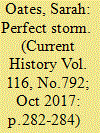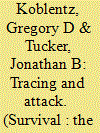|
|
|
Sort Order |
|
|
|
Items / Page
|
|
|
|
|
|
|
| Srl | Item |
| 1 |
ID:
119250


|
|
|
|
|
| Publication |
2013.
|
| Summary/Abstract |
Is arms control becoming irrelevant? This analysis offers a new way of testing the decline of arms control. Rather than focusing on foreign policy outputs and international outcomes, this analysis examines perceptions of security policy decision makers and opinion leaders through their references to arms control. Salience and framing analysis are used to evaluate the marginalization of arms control in political communication. Empirically, the article examines selected American media coverage, research institute publications, and the Congressional Record. This research confirms a dwindling number of references to the concept of arms control over the last two decades. This trend is not explained by the emergence of new technological issues, nor does it follow the chronological pattern of actual arms control successes and failures. Rather it hints at a more fundamental transformation of political thought.
|
|
|
|
|
|
|
|
|
|
|
|
|
|
|
|
| 2 |
ID:
085962


|
|
|
|
|
| Publication |
2009.
|
| Summary/Abstract |
In his 2006 commencement address at Tufts University, Arthur Ochs Sulzberger, Jr., the publisher of The New York Times, praised his newspaper for adopting a journalism reflecting the "courage of our own convictions." He meant it as a compliment, but his words had a different meaning to those who have had occasion to suspect that the news coverage of the Times is not infrequently driven by an agenda-its "own convictions"-rather than objectivity. Did the Times practice agenda journalism in its coverage of the recent fighting in Gaza? Many readers apparently thought so, and the Times made repeated attempts to rebut their adverse comments. The paper's managing editor, the chief of its Jerusalem bureau, and its public editor all published articles or interviews seeking to absolve themselves, or the Times, from the charge that its published reportage had tilted toward the side of the Palestinians.
|
|
|
|
|
|
|
|
|
|
|
|
|
|
|
|
| 3 |
ID:
155572


|
|
|
|
|
| Summary/Abstract |
The Russian state-sponsored campaign to spread disinformation abroad has found fertile ground in the United States, thanks to upheaval in the news media and politicians’ denigration of the press.
|
|
|
|
|
|
|
|
|
|
|
|
|
|
|
|
| 4 |
ID:
139428


|
|
|
|
|
| Summary/Abstract |
Broken down by occupation, more American journalists worked clandestinely for Soviet intelligence in the United States during the early 1940s than in any other profession except engineering. However, since reporters had no direct access to government secrets, most research focuses on their role as messengers, recruiters, and sources of inside information. While not discounting these roles, this article argues that journalist spies also collected a large amount of secret diplomatic and military information. Covering the years 1941 through 1946, this article also shows that the information collected by these spies evolved as World War II morphed into the Cold War.
|
|
|
|
|
|
|
|
|
|
|
|
|
|
|
|
| 5 |
ID:
096004


|
|
|
|
|
| Publication |
2010.
|
| Summary/Abstract |
On 18 September 2001, exactly one week after the 11 September terrorist attacks in the United States, five letters containing dry powdered spores of Bacillus anthracis - rugged, seed-like forms of the bacterium that causes anthrax - were mailed to media outlets in Florida and New York City. Three weeks later, two more letters containing a more refined preparation of anthrax spores were sent to US Senators Tom Daschle and Patrick Leahy in Washington DC. The tainted letters contaminated several buildings and caused 22 cases of anthrax (half involving the skin and half the lungs) in five states and the District of Columbia. Five of the people who contracted the inhalational form of anthrax died: two US Postal Service employees in Washington; an employee of American Media, Inc. in Boca Raton, Florida; a 94-year-old woman in Oxford, Connecticut; and a hospital worker in New York City. The anthrax letter attacks also had pervasive ripple effects, forcing thousands of people to take antibiotics as a precaution, disrupting the US Postal Service, temporarily shutting down the US Senate, causing nationwide anxiety about the safety of the mail, and triggering a flood of false alarms and hoaxes involving white powders. All told, the cost of the incident was estimated at $6 billion.
|
|
|
|
|
|
|
|
|
|
|
|
|
|
|
|
|
|
|
|
|